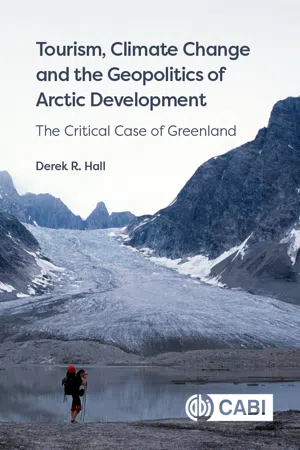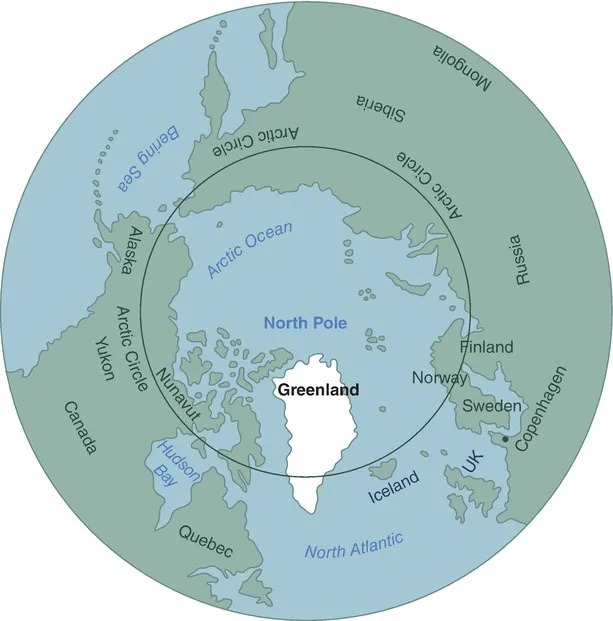
Tourism, Climate Change and the Geopolitics of Arctic Development
The Critical Case of Greenland
Derek Hall
- 216 pages
- English
- ePUB (adapté aux mobiles)
- Disponible sur iOS et Android
Tourism, Climate Change and the Geopolitics of Arctic Development
The Critical Case of Greenland
Derek Hall
À propos de ce livre
Greenland is becoming a critically important territory in terms of tourism, climate change and competition for resource access, yet it has been poorly represented in academic literature. Tourism now features as a major source of income for the territory alongside fisheries. Cruise tourism is increasing rapidly, and might superficially appear to be best suited to Greenlandic conditions, given the lack of large-scale accommodation infrastructure and almost non-existent land routes between settlements. Ironically, one of the most spectacular tourist attractions is the large number of icebergs that are being calved as the result of glacier retreat and ice cap melting, both appearing to be taking place at ever increasing rates. As a consequence of ice removal, the territory's claimed extensive range of mineral resources, not least rare earth elements and hydrocarbons, are becoming more accessible for exploitation and, thereby, are acting increasingly as the focus for geopolitical competition. This book explores the nature of dynamics between tourism, climate change and the geopolitics of natural resource exploitation in the Arctic and examines their interrelationships specifically in the critical context of Greenland, but within a framework that emphasises the wider global implications of the outcomes of such interrelationships.This book is the first to explore these interrelationships in depth in English.
Foire aux questions
Informations
Part 1:
Arctic Context
1
Framing the Arctic
‘The Arctic’s always changing … Even in winter it’s not quite static. You can kind of feel the planet moving all the time. It’s like having an extra-terrestrial view’ (Sarah Moss, 2009: 62)‘… the Arctic is not a single place but is a wide and diverse region that is in a constant state of change’ (Hansen and Johnstone, 2020: 296)
1.1 Introduction
- a growing social and political focus on climate change that is most strongly exhibited here (e.g. Barr, 2015; Broadbent and Lantto, 2016; Vincent, 2020);
- a heightening of geopolitical interest following a relative opening up of the region as a result of climate warming (e.g. Pelaudeix, 2017; Welch, 2020); and
- intensified debates over the sustainable use of natural and cultural resources, including those for tourism and travel (e.g. Bertelsen and Justinussen, 2017; Huijbens and Lamers, 2017; Bjørst, 2019).

Box 1.1. Forces remaking the Arctic
1.2 Arctic ‘imaginaries’
The imaginary constitutes within itself a loose frame for understanding that of which we have no direct contact … It can represent a means of meaning-making that is felt, experienced and embodied … and whether real or otherwise, the imaginary in a general sense comes with us and … shapes the sorts of worlds we create … the imaginary can become so entrenched that it becomes the way of seeing … that is difficult to dislodge.(White et al., 2019: 2).
Box 1.2. Arctic ‘imaginaries’
Table des matières
- Cover
- Title page
- Copyright
- Contents
- Figures
- Tables
- Boxes
- Abbreviations
- Contributors
- Preface
- Part 1: Arctic Context
- Part 2: Dynamic Greenland
- Part 3: Conclusions
- References
- Index
- Back Cover